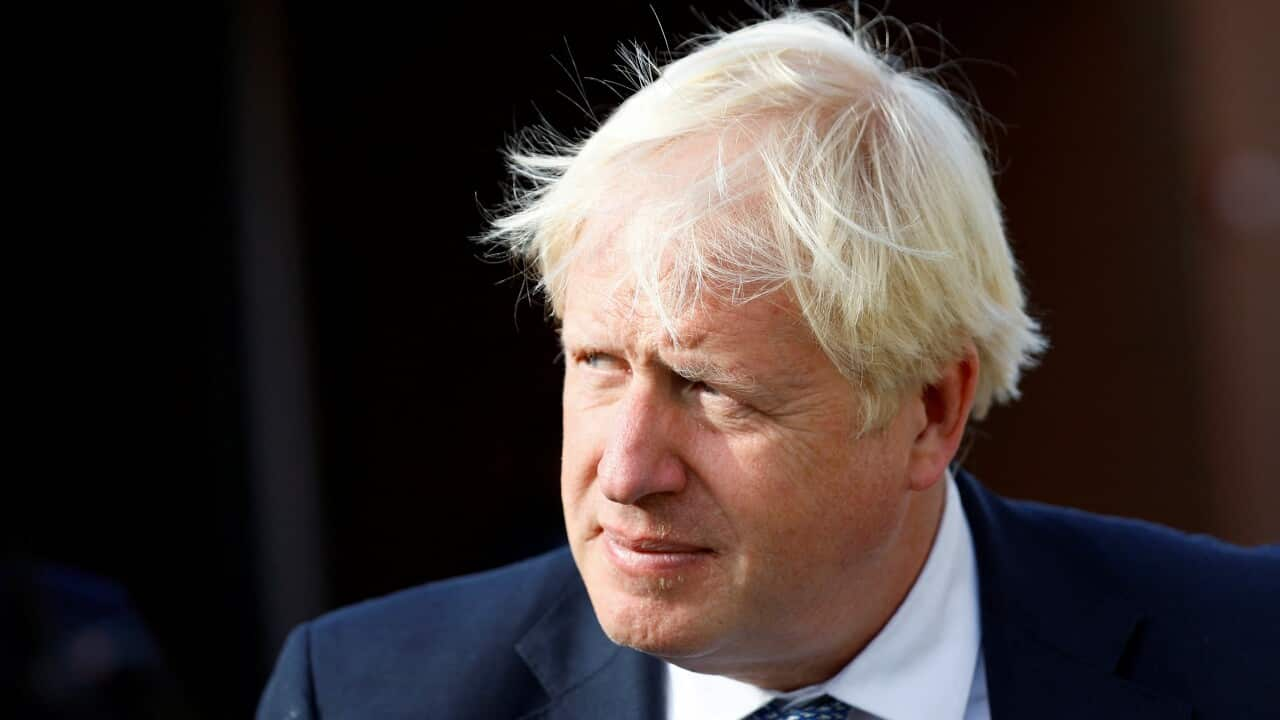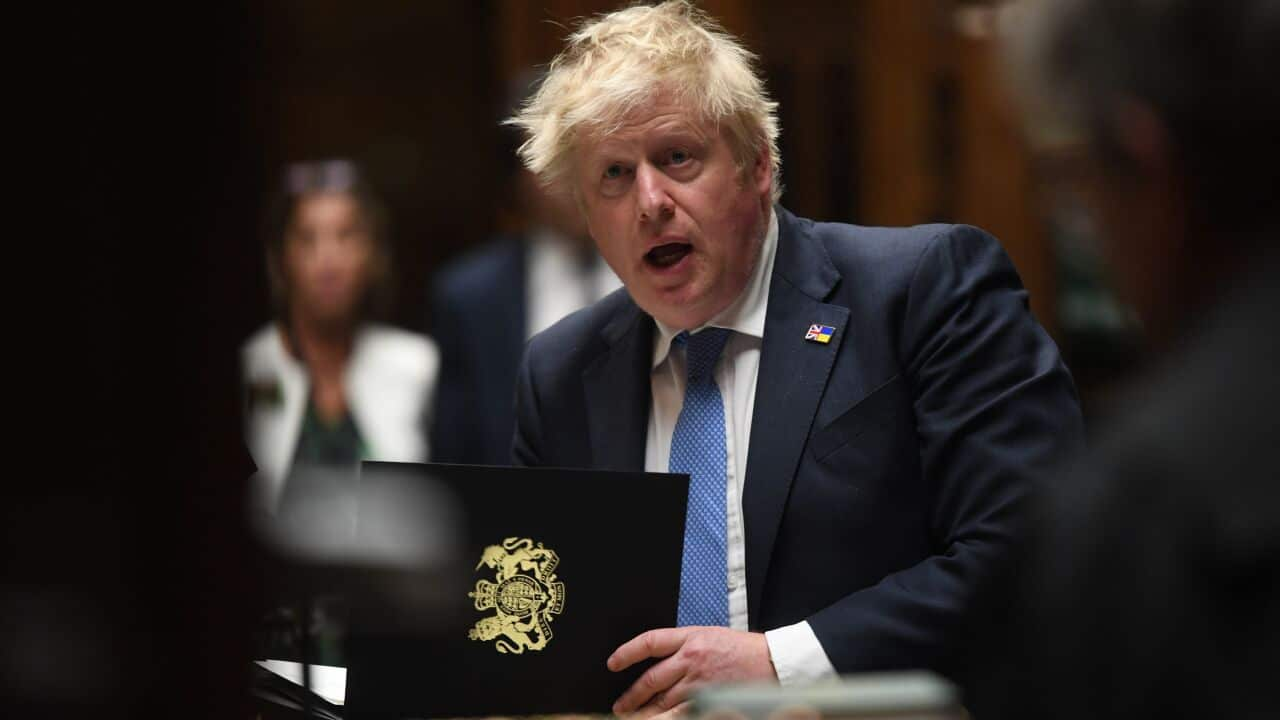Key Points
- UK MPs have voted to endorse a report that found Boris Johnson deliberately lied about rule-breaking parties.
- The report was released last week after a year-long investigation.
- Mr Johnson avoided potential suspension by resigning as an MP just days before the damning report was released.
The UK parliament has delivered another blow to the political career of former prime minister Boris Johnson, endorsing a report that concluded he deliberately lied over rule-breaking parties.
Mr Johnson abruptly resigned from parliament earlier this month after seeing an advance copy of the findings of a year-long investigation into his conduct during the COVID-19 pandemic when lockdown-breaking parties were held in Downing Street.
Here's what you need to know.
What was in the committee report?
The committee published its findings last week concluding that Mr Johnson had deliberately lied to colleagues when he assured the House of Commons that all COVID-19 rules had been followed at all times in government buildings.
The report recommended Mr Johnson should be denied a pass giving him automatic access to parliament and would have recommended suspending him from the House of Commons for 90 days if he had not already resigned.
The Privileges Committee, which investigates breaches of House of Commons rules, concluded that Mr Johnson was guilty of "repeated contempts (of parliament) and ... seeking to undermine the parliamentary process".
"The contempt was all the more serious because it was committed by the prime minister, the most senior member of the government," it stated in a damning 106-page report.
"There is no precedent for a prime minister having been found to have deliberately misled the House.
"He misled the House on an issue of the greatest importance to the House and to the public, and did so repeatedly."
The seven-member committee, which has a majority of MPs from Mr Johnson's own Conservative party, has powers to recommend sanctions on rule-breakers that have to be voted on by MPs.
"Partygate" led to Mr Johnson and dozens of government officials being fined by police for breaking the social distancing laws the government set to curtail the spread of COVID-19.
Months of newspaper revelations about boozy gatherings, including on the eve of the socially distanced funeral of Queen Elizabeth II's husband, Philip, caused widespread public outrage.
What happened in parliament?
On Monday, MPs in the House of Commons voted 354 to seven to endorse the committee's report after a five-hour debate on its findings.
Parliament's decision to back the conclusions of the report does not stop Mr Johnson from standing again to be a member of the House of Commons, but it's an embarrassing punishment for a politician who was still prime minister a year ago.
Most politicians who spoke in parliament on Monday criticised Mr Johnson's behaviour, while a handful of his supporters questioned the impartiality of the committee.
Former prime minister Theresa May warned Mr Johnson's supporters not to vote against the committee's report, saying doing so would erode the public's faith in democracy.
Jacob Rees-Mogg, who was a minister in Mr Johnson's government, said it was "perfectly reasonable" to challenge the views of the committee and suggested MPs investigating the former prime minister had "wanted to come to a particular conclusion".
Senior politicians in the governing Conservative Party, including Prime Minister Rishi Sunak and many members of the cabinet, skipped the debate and avoided voting on Monday to avoid increasing tensions with party members who remain loyal to the former prime minister.
Mr Sunak, who promised a government of integrity, did not attend the debate in parliament because he was welcoming the prime minister of Sweden and had other meetings, his spokesman said earlier.
What has Boris Johnson said?
In his resignation statement last Friday, Mr Johnson, who quit as prime minister last July due to "Partygate" and a string of other scandals, claimed he was the victim of a stitch-up by his political opponents in a "kangaroo court".
He was unrepentant again on Thursday, calling the report "deranged" and the 14-month inquiry into his statements to parliament a "charade".
He insisted his attendance at the Downing Street parties in question was "lawful, and required" by his job.
"This is a dreadful day for MPs and for democracy," Mr Johnson said in an angry 1,700-word statement.
"This decision means that no MP is free from vendetta, or expulsion on trumped-up charges by a tiny minority who want to see him or her gone from the Commons.
"I do not have the slightest contempt for Parliament, or for the important work that should be done by the Privileges Committee.
"But for the Privileges Committee to use its prerogatives in this anti-democratic way, to bring about what is intended to be the final knife-thrust in a protracted political assassination, that is beneath contempt."
Who is Boris Johnson?
Mr Johnson came to power almost four years ago, promising to deliver Brexit and rescue it from the bitter wrangling that followed the 2016 referendum.
He shrugged off concerns from some fellow Conservatives that his narcissism, failure to deal with details, and reputation for deceit meant he was unsuitable.
Some Conservatives enthusiastically backed the former journalist and London mayor, while others, despite reservations, supported him because he was able to appeal to parts of the electorate that usually rejected their party.

A report from MPs has shown former UK prime minister Boris Johnson deliberately misled Parliament over parties at 10 Downing Street during the COVID-19 lockdown. Source: AAP / Neil Hall
But his administration's combative and often chaotic approach to governing and the scandals exhausted the goodwill of many of his MPs.
Opinion polls show he is no longer popular with the public at large.











